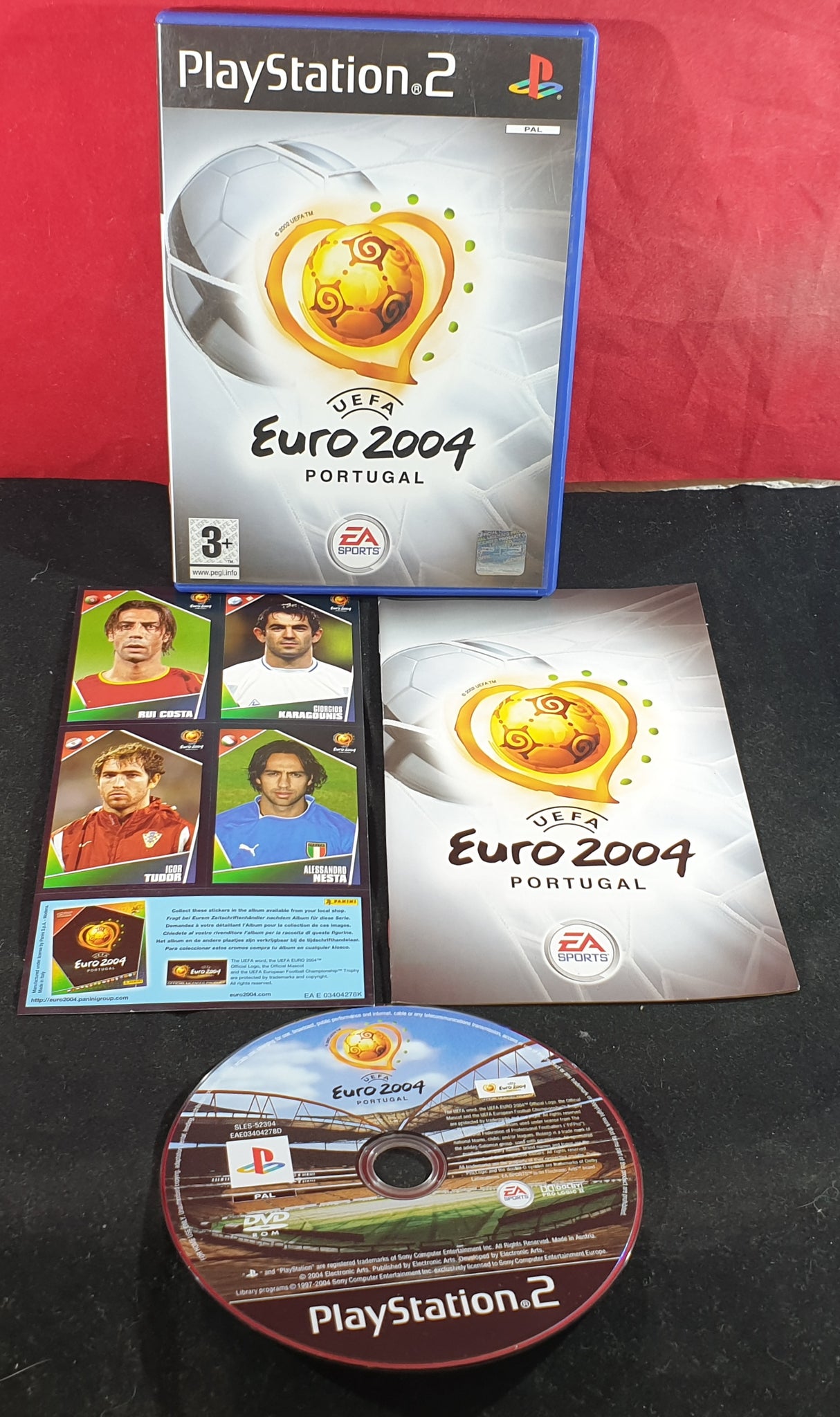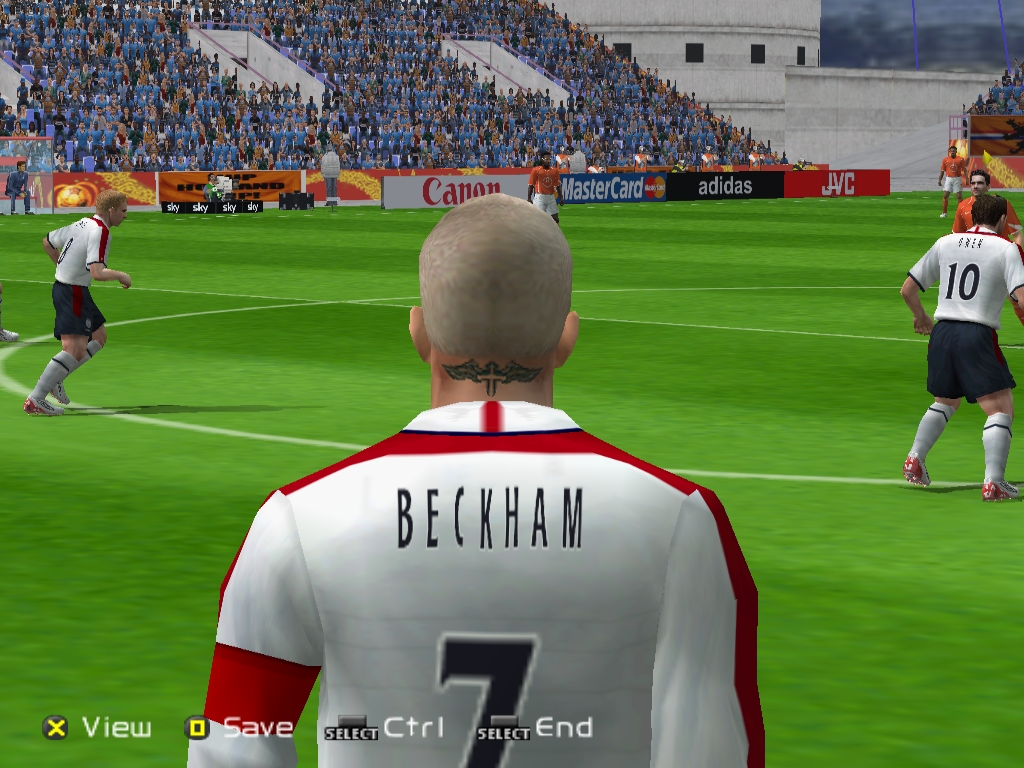
Although casual gamers may fail to recognize the appeal of this more region-specific competition ("What? No Brazilian team?"), and while the FIFA line, with dozens of additional teams to choose from, admittedly offers a deeper experience overall, UEFA Euro 2004 nevertheless stands out as a first rate title that will greatly appease hardcore soccer fans and sports gamers alike. As one would expect, most of the menu options, control features, and even the overall look and feel of this game are very similar to the FIFA games, with several notable differences. The first unique touch that grants this game hardcore status is the option to select either English or Spanish audio commentary. Playing the game with Spanish enabled gives one the authentic feeling of viewing the competition on an international channel such as Telemundo.
It was released in October 2008 for Windows, Nintendo DS, PlayStation 2.Man, that girl can play! In English, the commentary is well balanced and eerily accurate for the most part. As in any sports title, certain comments are redundant after a while, but in this particular case the comments vary enough to prevent this from becoming an annoyance. In fact, the only notable drawback is that the commentary does not always synch up perfectly with the gameplay, which proves awkward at times. This is not a persistent problem, but there were several occasions when I took a shot on goal, missed it, and found myself elsewhere on the field when one of the announcers suddenly awoke from his apparent catatonic trance to emotionally respond as if the shot was on its way in. The best and largest selection of PlayStation 2 video game cheats, PlayStation 2 video game codes, PlayStation 2 video game cheat codes, PlayStation 2 cheatcodes, PlayStation 2 passwords, PlayStation 2 hints, PlayStation 2 tips, PlayStation 2 tricks, PlayStation 2 strategy guides, PlayStation 2 FAQs, codes for PlayStation 2, playstation 2 codes, playstation 2 cheats, playstation 2 cheat codes.
Players call to one another on the field in their native tongue, the crowd chants, cheers, moans, groans, and even taunts at the appropriate times, and the ref blows the whistle whenever necessary. In the practice mode, which appropriately lacks commentary, birds quietly chirp in the distance as players communicate with one another on the field. UEFA Euro 2004 PC Windows NEW TRENDnet TPE117GI Gigabit Ultra PoE.uefa euro 2004 portugal b: Size: 1189 x 929: Filesize: 146.04 KB: To save right click on the cover below and choose Save Picture As.

A stoppage-time goal by Cristiano Ronaldo proved no more than a consolation. Giorgos Karagounis put the Greeks ahead after only seven minutes and Angelos Basinas made it 2–0 from the penalty spot on 51 minutes. Summary Group A opened with a shock as Greece, ranked outsiders from start, defeated the hosts 2–1. In the closing ceremony, Portuguese-Canadian singer Nelly Furtado performed her single and official tournament theme song, " Força".Portugal were announced as hosts for UEFA Euro 2004 on 12 October 1999, in Aachen, Germany, beating Spain and the joint bid of Austria and Hungary. As winners, Greece earned the right to represent Europe at the 2005 FIFA Confederations Cup.During the opening ceremony, one of the tableaux depicted a ship – symbolising the voyages of the Portuguese explorers – sailing through a sea that transformed into the flags of all competing countries. Greece's triumph was unexpected, considering that they had only qualified for two other major tournaments, the UEFA Euro 1980 and the 1994 FIFA World Cup, where they failed to win a single match.
Greece advanced to the quarter-finals as runners-up, ahead of Spain on goals scored. Nuno Gomes scored the winning goal against Spain, which ensured Portugal finished top of Group A. Portugal recovered from their opening defeat by defeating Russia 2–0, who had their keeper Sergei Ovchinnikov sent off.
Only 18 at the time, Rooney's goal-scoring ability proved instrumental in victories over Switzerland (3–0) and Croatia (4–2). England's other two games were memorable for the performances of their young star Wayne Rooney. Zinedine Zidane scored both goals the second from the penalty spot.

The Dutch progressed after winning the penalty shoot-out 5–4, their first victory on penalties in a major tournament. Sweden and the Netherlands played out an exciting but goalless encounter, even after a dramatic period of extra-time in which Freddie Ljungberg hit the inside of the Dutch goalpost. This victory made Greece the first team to defeat both the holders and the hosts in the same tournament. Firm defensive play and an Angelos Charisteas goal on 65 minutes helped Greece defeat France 1–0 and progress to the semi-finals. Portugal won 6–5, as Ricardo saved from Darius Vassell and then scored the winning goal himself.
The game ended 2–1 to Portugal and the hosts, after their opening day failure, were through to the final of the European Championship for the first time. An own goal from Jorge Andrade gave the Netherlands a glimmer of hope. Cristiano Ronaldo put the hosts in the lead from a corner kick midway through the first half, and just before the hour mark Maniche made it 2–0 with a spectacular goal from the corner of the penalty area. Angelos Charisteas (first from left with white shirt), scoring Greece's winner against Portugal in the final.Portugal and the Netherlands faced each other in the first semi-final.
Portugal attacked and dominated possession but once again, sturdy defending and goalkeeping from Greece kept the hosts off the scoreboard. The final was a repeat of the opening game of the tournament and Portugal were hoping to avenge their defeat. The game remained goalless until the dying moments of the first half of extra time, when Traianos Dellas headed home the winner, the first and only silver goal in a European Championship. The Czechs had several chances, including a shot from Tomáš Rosický that struck the bar. However, they would have to see off the upstart Greeks to do so. They were favourites to take the trophy, having won all four of their games.
Fifty teams were divided into ten groups of five and each team played two matches against all its opponents, on a home-and-away basis. Portugal became the first host nation to lose in a European Championship final.The draw for the qualifying round was held on 25 January 2002 at the Europarque Congress Centre, in Santa Maria da Feira, Portugal. All of Greece's wins in the knockout stage came in an identical manner: a 1–0 win, with the goal being a header off a cross from the right wing. Greece won the match 1–0 and were crowned European champions, a title that they were given a 150–1 chance of winning before the tournament. Portugal continued to press after the goal but even with five minutes of stoppage time, they could not find an equaliser.
^ Bold indicates champion for that year. Bulgaria, Croatia, Russia and Switzerland also took part in their second tournament finals since their debut in 1996.8 ( 1972, 1976, 1980, 1984, 1988, 1992, 1996, 2000)7 ( 1960, 1964, 1968, 1972, 1988, 1992, 1996) Latvia made its first appearance in a major football competition, while Greece returned to the European Championship finals after a 24-year absence. Qualified teams Ten of the sixteen finalists participated in the previous tournament in 2000. The first-placed teams from each group qualified automatically to the final tournament, whereas the ten runners-up took part in a two-legged play-off to select the remaining five teams that would join the host nation in the final tournament.
^ From 1960 to 1988, Russia competed as the Soviet Union, and in 1992 as CIS.The draw for the group stage took place on 30 November 2003 at the Pavilhão Atlântico in Lisbon, Portugal, where the 16 finalists were divided into four groups. ^ From 1972 to 1988, Germany competed as West Germany. ^ From 1960 to 1980, the Czech Republic competed as Czechoslovakia.
The remaining 15 teams were split into four pots, with title-holders France seeded alongside Sweden and the Czech Republic in the first pot. As host country, Portugal were automatically placed in position A1. Results from the final tournaments, play-off matches and friendly games were all ignored. The coefficient was calculated by dividing the number of all points scored (three points for a win, one for a draw) by the number of all matches played.


 0 kommentar(er)
0 kommentar(er)
